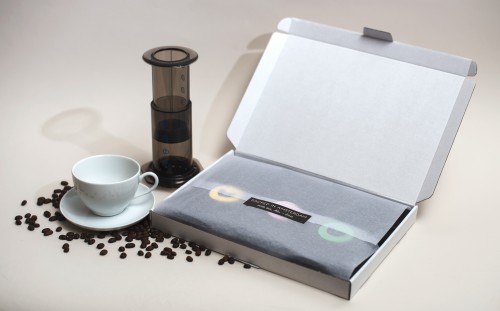The world of coffee is constantly changing, moving, adapting. In fact, specialty coffee is a whole world of its own within the wider world of coffee. These days it’s not longer sufficient to distinguish between Arabica and Robusta beans or to know the difference between a cappuccino and a latte.
No, today you are measured by your knowledge of the coffee’s origin, your choice of brew method and matching recipe, and if you’re on espresso duty, your latte art skills. Over the last 10-15 years, the commodity that we have come so accustomed to accept as omnipresent, has undergone an astonishing transformation that has seen true coffee lovers go back to the absolute basics of the product: good and responsible coffee growing, careful roasting and expert preparation.
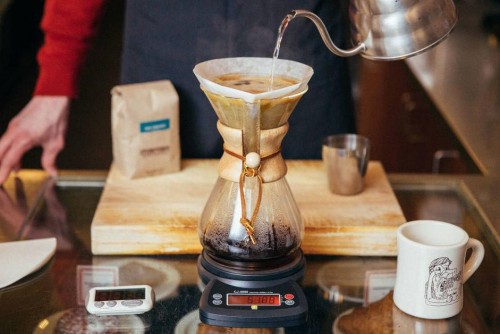
One of the earliest adopters of this refined trade was iconic Portland-based coffee brand Stumptown. Founded by Duane Sorenson in his garage in 1999, Stumptown has grown into something of a mother figure for many younger coffee entrepreneurs. Duane regularly set new standards in an industry that was dominated by large chains such as Starbucks and Costa and where the art of making coffee was replaced with speed and cost cutting.
Over the years much has happened at Stumptown. One shop has become ten, and one roastery has become three. Its loyal following also means that the company supplies tons of accounts across the country and its business to consumer websales are an important element too. Since recently, Stumptown also sells its own canned and packed ‘ready to drink’ coffee beverages in convenience and grociery stores across the nation, pitching it right against the green mermaid from Seattle.
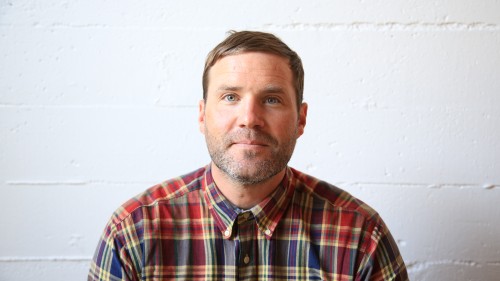
During a recent visit to Portland, The Coffeevine’s Alex Kitain was offered a unique tour around Stumptown’s HQ and roastery by the company’s VP Matt Lounsbury who also made the time to answer a few questions about the future of Stumptown.
Q: Matt, Stumptown has grown into a pretty big company over the past 16 years. How has this affected your relationship with small farmers and co-operatives?
A: Well, by global standards we’re still small, especially compared to some other big US brands. But I think one of the things that we’ve done pretty well on a strategic level has been to form relationships with perennial farmers who produce amazing coffees year in and year out.
And, we’re still buying micro-lots and we’re still paying top dollar for these outstanding coffees. Our concept of Direct Trade, if you want to call it like that, is still very much supported by this practice. Our aim is to have better and better coffees every year and that can only be achieved by being super close to the people who grow and process these coffees.
Q: You handle a lot of different coffees that end up in a variety of bags, boxes and, since recently, cans. Can you seriously still consider yourself a ‘smallish’ player who picks out the finest crops?
A: Yes! Our product mix is so diverse that we often buy really tiny lots from really small producers that don’t last more than two week before they’re gone. We call them Grand Cru coffees, i.e. the coffees we pay a lot of money for or that we consider to be really exquisite. To highlight this, they are often put into different packaging. We always want to continue surprising people in the industry. For instance we are going to make a Geisha Grand Cru cold brew. How great does that sound?
Q: Ummm. Delish! When can I get my hands on it? But back to buiness. All this relationship management must be very hard work and require your team to constantly be on the ball. How often do you break with producers who don’t meet your standards?
A: All the time! We just broke with an Ethiopian producer for example, who is really loved by everybody but the quality simply isn’t there. We have given him lots of advise and pointed him in the right direction but he can’t quite get the processes sorted out so we’re going to take a step away from him for now.
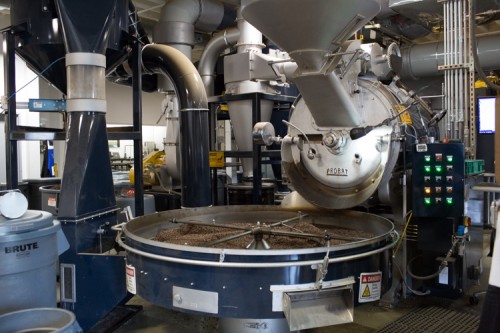
Q: How healthy is Stumptown at this moment?
A: Very healthy! We brought on investors four years ago, which was a big stir in the industry at the time. But instead of suddenly opening 50 new stores we’ve been really methodical about how we want to do this. We opened a café in the West Village in New York, we opened a roastery in LA and we’re opening in Austin and New Orleans soon.
[Since recording this interview, Matt announced on October 6th of 2015 that Stumptown had been acquired by huge coffee chain Peet’s Coffee for an undisclosed amount. This will most likely change the course of the company’s future but it’s too early to make concrete predictions]
And we’ll continue doing that. For us the most important thing is getting freshly roasted and perfectly brewed coffee to the people and although it’s not rocket science, we have our particular way with regards to how we want to achieve this.
We also want to bring great coffee to big metropolitan areas that have so far been left behind [like Washington D.C.].
Q: Even New York was pretty awful a few years ago. Was that the reason you set up shop there?
A: Yep, when we showed up six years ago you could literally count the number of good coffee bars on one hand, actually less than one hand! Now the city is really flourishing. It’s wonderful to see!
Q: How do you guys view all the small coffee roasters that have popped up everywhere in recent years? Here in Portland you have Heart and Coava, for example.
A: Portland is probably one of the best examples of how a very high quality coffee culture became very entrenched in the local population. Scandinavia is a good European comparison if you like but here in the US I’ve been witnessing it only here and in maybe San Diego.
In fact, these independent coffee and restaurant businesses that are really shaking things up are doing a great deal towards community building, job creation and much more. We’d love to see this happen in more and more places.
“Anyone who is building a café in the States now will have an espresso machine, sure, but they are probably also incorporating draft and nitro, if they know their stuff.”
To me Portland has done a great job in combining small, medium and large roasters under one roof and the fact that everyone’s got such a high standard here means that we’re not resting on our laurels. In fact, one of the things that we have done here in Oregon, which is testimony to our community feeling, is having started the Orgeon Coffee Board with the support of one of our Congressmen.
Just about every single coffee roaster in Portland is a member and together we are putting the brand ‘Oregon’ on the map, not unlike the local wine industry did many years ago.
This helps everyone in the industry to learn, improve and share costs on certain things. We had this saying here in Portland that you could hit a golfball into any direction and you’d hit 6-7 great coffee shops. Now, where we are here (Stumptown HQ) I can probably say that I can hit a golfball into any direction and hit 6-7 great coffee roasters!
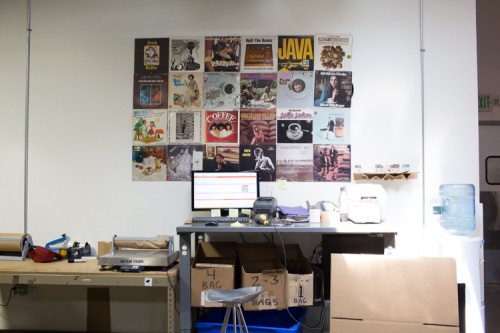
Q: That is actually also something that many roasters in Amsterdam say. There’s a real community there that is built on helping each other out. For example, some roasters team up to buy coffee together or they might share their staff.
A: That’s amazing! It should always be everyone’s goal to form a community that helps rather than cuts your throat. For instance, here in Portland we need people to help us and come with us when we conquer the grocery stores. We don’t want to be the only ones on the shelves there.
Q: Excellent! This was going to be my next point. You guys have indeed ventured into the big retail world. So, apart from reaching a ton of new customers who might have never heard of you or tried your product, what else are you hoping to achieve with this move?
A: First of all, coffee professionals need to remember that most people still buy their coffee in the grocery store. It’s a simple fact and nothing more than a result of habit and convenience. Most people drink coffee at home.
And they don’t think about going to a specialty coffee shop to get their beans or ground coffee.
Portland’s already a bit further ahead I think but outside of the city, you need to make people who spend $10 on 6-pack of craft beer understand why they should probably also spend $15 on a pack of coffee. In most cases they are actually willing to do that, but they have to have access to it first.
Q: Earlier we walked past a team of testers who were ‘cupping’ your ready-made drinks. Not just the cold brew but also your chocolate coffee drink and so on. Obviously, these ready to go beverages are closer to what Starbucks offers at almost every convenience store across the country but they also open up a whole new market to you, don’t they?
A: Yes totally! And it’s a lot easier. Our drivers spend about 1 hour per grocery store rotating the new and old coffees around and that is very costly and time consuming. Where you have people serving your coffee you have a lot of training to do to make sure they offer a consistent and representative quality.
The cold brew doesn’t require that. It’s a really fun thing because we kinda started it out of thin air. Until not too long ago everyone here served Toddy coffee, which tasted kinda good but was not a great thing to make.
Q: How much of your annual sales does cold brew account for now?
A: When we first started selling it outside of our cafés it was probably around 1%. Now it’s getting close to 10%.
It’s been super fun to watch this category grow. If you told me five years ago that this would happen I had probably called you crazy.
“We don’t necessarily look for hipsters with tattoos to come work here. We want interesting people with a story to tell.”
In fact, specialty coffee has become a full-blown category in the grocery stores and they really want to stock it. In 2014 ready-to-drink-coffee was the fastest growing category there, period. And a big part of that might of course be Starbucks Frappuccino but a big and fast growing part is specialty coffee cold brew.
We’ve had to learn a lot of new things, about logistics, cold transport and so on.
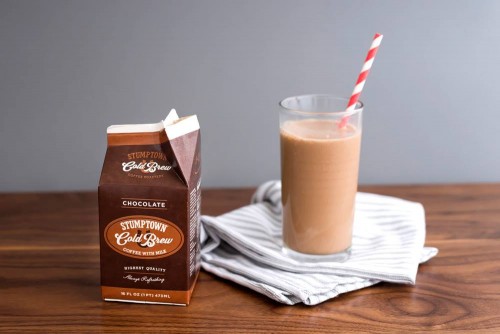
(courtesy of Stumptown)
Q: What do you foresee as the next big trend in specialty coffee?
A: I think draft coffee will become more and more popular. Nitro coffee is already readily available in all of our cafés and we’re putting it right in people’s views to entice them to try it. Anyone who is building a café in the States now will have an espresso machine, sure, but they are probably also incorporating draft and nitro, if they know their stuff.
Q: So apart from New Orleans, Austin and Washington D.C. where else will you be going?
A: Well New Orleans is the capital of iced coffee so that will be our first cold brew centred bar that happens to have hot coffee as well.
We loved being in Amsterdam when we did the pop up there and yes we have the ambition to take Stumptown to places outside of the US but there’s only so much money and so much we can do. I mean Paris, Seoul and Tokyo would be great, there’s so much happening there. If of the next 10 cafés that we open one could be overseas that would be super exciting!
Q: Blue Bottle and Coutume have opened shops in Tokyo. That place is really happening!
A: Yes it is! I used to travel to Japan a lot for work and we have a great partner there, Padlers Coffee, and he serves our coffee but Tokyo is very hard and expensive. But there are a lot of other places we could consider.
Q: How about something like Cape Town?
A: Exactly! When our president and my boss recently asked me “don’t you have any reach cities?”, I gave him a few in the US and Paris. So we’ll see, haha! Amsterdam would be a no-brainer really. Duane really loves Amsterdam and a lot of the global coffee goes through Amsterdam so the city keeps popping up in front of our eyes.
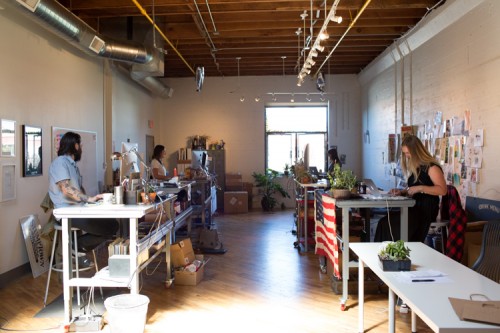
Q: Finally, if Stumptown were a rockband who would they be?
A: Jesus! That is such a effing good question! You know, we recently did a survey amongst our 350 or so employees and roughly 80% of them are either artists or musicians. It has always been this way. We don’t necessarily look for hipsters with tattoos to come work here. We want interesting people with a story to tell.
Actually if we were an album, we’d probably be the “Workers Comp”. Our founder once paid for every musician in the company to record and put out a 180g vinyl record of his or her own music so if you collected all of those you’d get an amazing boxset of tons of different styles.
Q: Thank you for your time!
You can visit one of Stumptown’s 10 locations across the US or order their coffee online at www.stumptowncoffee.com
Not yet a member of our critically acclaimed coffee club? Join today or give as gift!
Global shipping available


